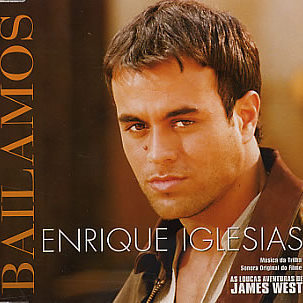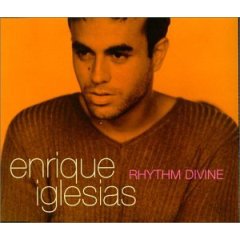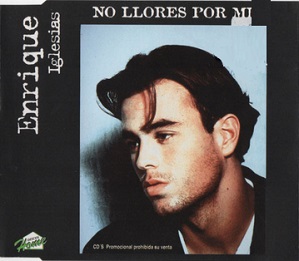
Enrique Miguel Iglesias Preysler is a Spanish singer and songwriter. He started his recording career in the mid-1990s on the Mexican label Fonovisa and became the bestselling Spanish-language act of the decade. By the turn of the millennium, he made a successful crossover into the mainstream English-language market. He signed a multi-album deal with Universal Music Group for US$68 million with Universal Music Latino to release his Spanish albums and Interscope Records to release English albums. Enrique is the third child of Spanish singer-songwriter Julio Iglesias.

"Bailamos" is a single by Spanish singer Enrique Iglesias sung in English with some lines in Spanish. The song was released in 1999 as part of the soundtrack to the film Wild Wild West (1999) and later included on Iglesias's fourth and debut English-language album, Enrique (1999). "Bailamos" reached number one on the Spanish Singles Chart and on the US Billboard Hot 100, and it became a top-three hit in Canada, Hungary, New Zealand, Norway, and Sweden. In both New Zealand and Spain, it was the second-most-successful single of 1999.

"Be with You" is a song by Spanish singer-songwriter Enrique Iglesias, released on 29 February 2000 through Interscope Records as the third single from Iglesias's debut English-language studio album, Enrique (1999). It was co-written by Iglesias and produced by Mark Taylor and Brian Rawling, the team responsible for Cher's hit song "Believe". Iglesias once stated that he initially came up with the lyrics of the song while taking a break from recording in London's Hyde Park. He also recorded a Spanish version of the song titled "Sólo me importas tú".

"Rhythm Divine" is a song by Spanish singer Enrique Iglesias from his fourth studio album, Enrique (1999). The song was written by Paul Barry and Mark Taylor with Taylor and Brian Rawling handling its production. It is a dance-pop rhythmic romantic ballad that mixes with Latin and Mediterranean music. Lyrically, Iglesias asks the listener if they can hear the rhythm, and one music journalist compared it to USA for Africa's "We Are the World" (1985). A Spanish-language translation of the song titled "Ritmo Total" was also recorded and features additional lyrical contributions by Rafael Pérez-Botija.

"Escape" is a song written by Enrique Iglesias, Steve Morales, Kara DioGuardi, and David Siegel for Iglesias' fifth studio album, Escape (2001). The song is the album's opening track and was released as its second single. In Japan, "Escape" was released on 23 January 2002 as a double A-side with "Hero", while in the United States, it was serviced to radio five days later. The song reached number three in the UK and number 12 on the US Billboard Hot 100. A Spanish version of the song, titled "Escapar", reached number nine in Iglesias's native Spain.

Spanish singer Enrique Iglesias has released 11 studio albums, five compilation albums, 62 singles, and 80 music videos. Iglesias started his career in 1995 with his first Spanish album and self-titled album Enrique Iglesias, which produced five number-ones on the Hot Latin Tracks chart and won a Grammy Award for Best Latin Pop Album in 1997. In 1999, he released his first English album Enrique, which included the song "Bailamos" from the film Wild Wild West. The album produced two number-one Billboard Hot 100 tracks. In 2001, Enrique released Escape which has sold over 8 million copies worldwide.

"Experiencia Religiosa" is the second single released by Spanish singer-songwriter Enrique Iglesias from his eponymous debut studio album Enrique Iglesias (1995), It was released by Fonovisa on 11 December 1995. The song was awarded "Pop Song of the Year" at the Lo Nuestro Awards award, and the Music Video also was nominated for Video of the Year the previous year. The track was written by Chein García Alonso, produced by Rafael Pérez-Botija and became another successful release for Iglesias. The song includes a gospel arrangement on the choruses. An Italian version was also released on the Italian pressings of the album Enrique Iglesias. The track debuted in the United States Billboard Hot Latin Tracks chart at number 33 on 10 February 1996, while his previous single was at number 4 on the same chart. The track peaked at number 1, for three weeks on 20 April 1996. The single spent five weeks in Billboard's top 20 Mexican Regional Songs, peaking at number 2. According to the newspaper El Siglo de Torreón, the music was well performed in cities of: Chile, México, and Puerto Rico.

"No Llores Por Mí" is the fourth single released by Spanish singer-songwriter Enrique Iglesias from his eponymous debut studio album Enrique Iglesias (1995), It was released by Fonovisa on 6 May 1996.

"Trapecista" is the sixth and last single released by Spanish singer-songwriter Enrique Iglesias from his eponymous debut studio album Enrique Iglesias (1995), It was released by Fonovisa on 16 September 1996.

"Enamorado Por Primera Vez" is a song by Spanish singer Enrique Iglesias from his second studio album, Vivir (1997). The song was written by Iglesias and produced by Rafael Pérez-Botija. It was released as the lead single from the album on 18 January 1997. A pop power ballad which he wrote when he was 18, the song is about the singer feeling like he is falling in love for the first time again. The song received positive reactions from three music journalists, although one critic wrote an unfavorable review of it.

"Miente" is a song by Spanish singer Enrique Iglesias from his second studio album, Vivir (1997). The song was written and produced by Rafael Pérez-Botija. It was released as the third single from the album in 1997. An uptempo pop power ballad backed by a piano and percussion, the song deals with the singer being in denial about a relationship ending.

"Lluvia Cae" is the title of the fifth single released by Spanish singer-songwriter Enrique Iglesias from his second studio album, Vivir (1997), It was released on 13 October 1997.

"Al Despertar" is the title of the sixth single released by Spanish singer-songwriter Enrique Iglesias from his second studio album, Vivir (1997), It was released on 8 December 1997.

"Revolución" ("Revolution") is the title of the fourth single released by Spanish singer-songwriter Enrique Iglesias from his second studio album, Vivir (1997), It was released on 18 August 1997.

"Quizás" ("Perhaps") is the second single released internationally by Spanish singer-songwriter Enrique Iglesias from his fourth fully Spanish language album Quizás (2002), It was released on 7 October 2002.

"Para Qué la Vida" is the third single released internationally by Spanish singer-songwriter Enrique Iglesias from his fourth full-Spanish album Quizás (2002). It was released on 6 January 2003.

Euphoria is the ninth studio album by Spanish singer-songwriter Enrique Iglesias. The album is a joint-release by Universal Republic and Universal Music Latino and was released on 5 July 2010 internationally and in the US on 6 July 2010. The album features guest appearances by Akon, Usher, Juan Luis Guerra, Pitbull, Nicole Scherzinger, Puerto Rican reggaeton duo Wisin & Yandel and Ludacris. The album consists of songs in English, and Spanish.

"Loco" is the lead Spanish single and overall second single from Enrique Iglesias's album, Sex and Love, featuring American singer Romeo Santos. This is Iglesias' second bachata song after "Cuando Me Enamoro". A banda version of the song was recorded which features Mexican singer Roberto Tapia. Another version of the song featuring Spanish singer India Martínez was released on iTunes on 17 December 2013. At the Latin Grammy Awards of 2014, the song received a nomination for Best Tropical Song.

"Bailando" (transl. "Dancing") is a song by Spanish singer-songwriter Enrique Iglesias for his tenth studio album Sex and Love (2014). Written by Iglesias with long-time collaborator Bueno, the first and Spanish version was released with Cuban artists Descemer Bueno and Gente de Zona. Shortly afterward, the official version of the song was released by Universal Republic Records as the sixth single from the album. The song spent 41 weeks at No. 1 on the Billboard Hot Latin Songs chart. "Bailando" was produced by Carlos Paucar.

"El Perdón" is a song by American singer Nicky Jam and Spanish singer Enrique Iglesias released as the first single to Nicky Jam's third studio album Fénix (2017). An English-language version of the song, titled "Forgiveness", was released on July 10, 2015. The single was later included on Enrique Iglesias' eleventh studio album Final (2021).




















